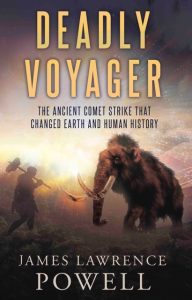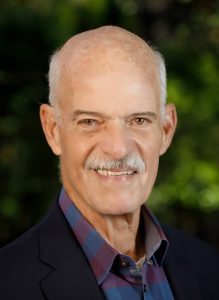The Ancient Comet Strike that Changed Earth and Human History: Lecture Recording
Free online lecture with author James L. Powell
Co-hosted by the Santa Ynez Valley Natural History Society and the Solvang Library
This lecture was presented Thursday, September 24, at 7:00 pm.
James L. Powell’s Deadly Voyager presentation link HERE.
Some 13,000 years ago, Earth’s nearness to the Sun and the tilt and direction of its axis aligned to warm the Northern Hemisphere and end the last Ice Age. Then in only a few years, the temperature plunged back to glacial frigidity and remained there for 1,300 years, a period that geologists call the Younger Dryas. Simultaneously, all the large mammals went extinct: the mammoth, the saber-toothed cat, the giant bison, and many more. The distinctive stone points of the Clovis people also disappear, never to be seen in archeological sites that date to time periods after the Younger Dryas.
Several generations of scientists have tried in vain to solve the trifold mystery. But could the answer be the same as that for the mystery of the death of the dinosaurs: the impact of an extraterrestrial object? A primary source of the physical evidence that may explain the Younger Dryas is found at Santa Rosa Island’s famous Arlington Springs archeological site. Dr. Powell will explore this research and his conclusions in his lecture, which is based on his new book “Deadly Voyager: The Ancient Comet Strike that Changed Earth and Human History.”
Dr. Powell graduated from Berea College with a degree in Geology. He holds a Ph.D. in Geochemistry from the Massachusetts Institute of Technology. He taught Geology at Oberlin College for over 20 years. He served as Acting President of Oberlin, President of Franklin and Marshall College, President of Reed College, President of the Franklin Institute Science Museum in Philadelphia, and President and Director of the Los Angeles County Museum of Natural History. President Ronald Reagan and later, President George H. W. Bush, appointed him to the National Science Board, where he served for 12 years. He is the author of numerous books that have been published by Columbia University Press and the University of California Press. In 2015 he was elected a Fellow of the Committee for Skeptical Inquiry (CSI) and currently is Executive Director of Graduate Fellowships for STEM Diversity. He even has an asteroid named for him: Asteroid 9739 Powell.










